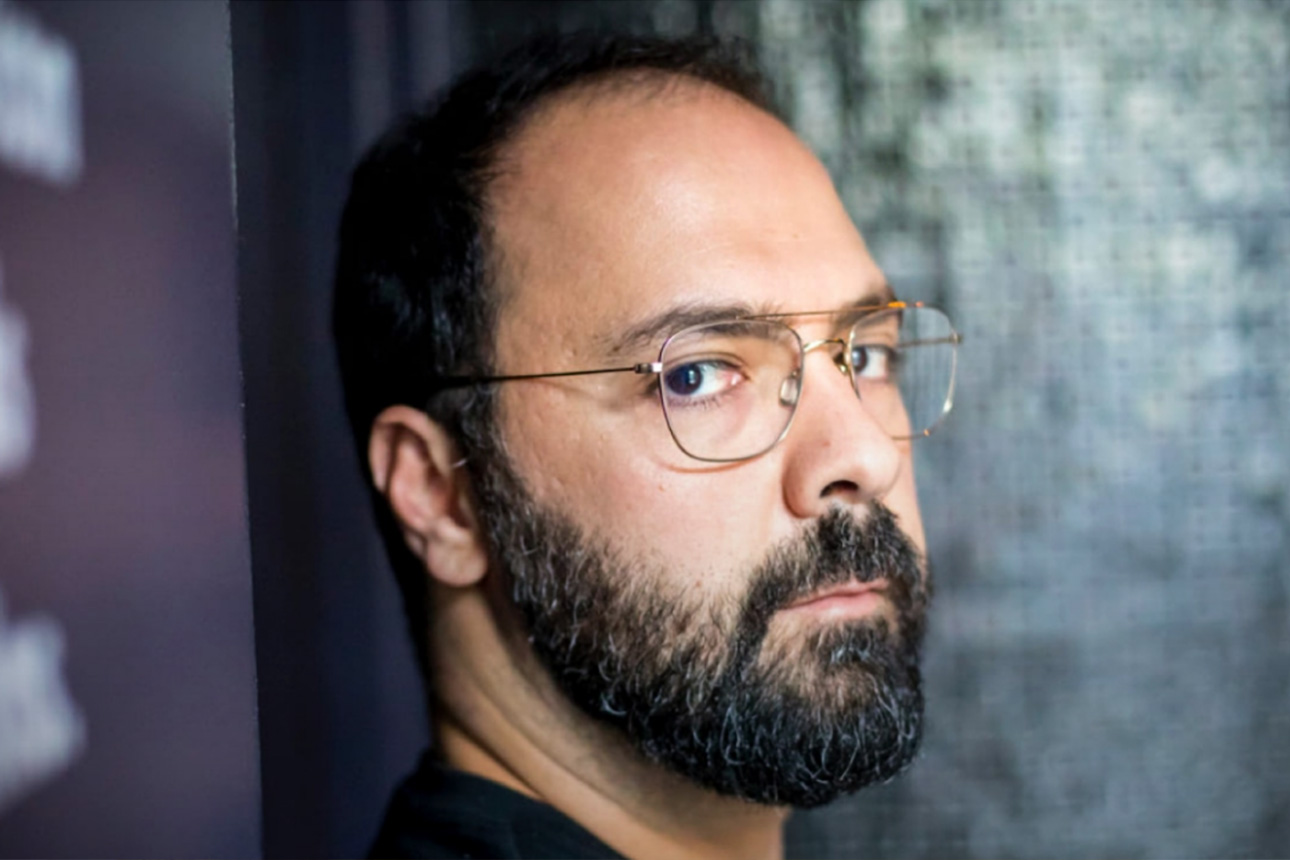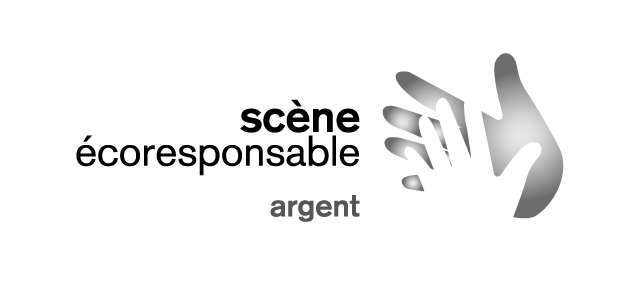ZÉRO: interview with Mani Soleymanlou

A veteran of stage and screen since graduating from the National Theatre School in 2008, Mani Soleymanlou is someone we could call a true ‘swiss army knife’. He is the writer, director and performer of ZÉRO, the show he will be presenting February 9th-12th. He is also the artistic director of the company Orange Noyée, founded in 2011, and the new artistic director of the French Theatre at the National Arts Center in Ottawa, since the summer of 2021. For our podcast series ‘En coulisses’, Cory Haas, artistic assistant for la Seizième, interviewed him. Here’s a taste.
What are you hoping to bequeath to your family, to your community, to your society?
Mani Soleymanlou: What we are trying to do with the company (Orange Noyée) and the shows we make is to stage various questions and doubts. It is a way to talk about a subject as large and instrumentalized as identity and attempt to stage a way to think about it, without necessarily arriving at a conclusion or settling it within a specific definition, space, or moment in time. We are looking to bequeath a certain way to nuance things and to come out of our current way of looking at the world as binary, meaning where it is all right or wrong, black or white, left or right. This space, which is a little more blurred, in between the two extremes, that’s what we are trying to stage. If we can bequeath the pleasure of doubting and questioning to the audience, to my family and my son, that would be huge.
Identity, what connects us in our society, is a driving force for you and for your work. Why is theatre the ideal place to talk about identity, to questions things around that subject?
Mani: I don’t know if it’s the ideal place, but it remains one of the only spaces, in my opinion, where we can sit next to each other, in a room, in the dark, with our phones off. You don’t know who is next to you, but we take moment, as a collective, to think about and reflect on our society. It’s one of the last spaces, maybe other than churches, but even there you’ll find less and less people. The theatre replaced the agora, or the space of worship in our society. It’s a space where we can dialogue, where there is literally dialogue in the present moment with lots of people. Whether 50 or 2000, something happens which is quite magical. Theatre is a slow art. We choose a subject, then think about it for 2, 3, 4 years and then we put it on stage. It’s tough to get through when theatre is not good, but it’s thrilling when it is really good. It’s an art form which is relatively slow in a time where everything is moving faster and faster. Time is something I like to take when nuancing questions of identity.
You premiered your first solo show, UN, 10 years ago. With this idea of slowness, of taking the time to reflect on society, have you seen large shifts in 10 years? Has the way you talk about things, identity, has that reflection changed with time?
Mani: Yes. When I made my first solo, which talked about my origins and where I came from, this idea of someone coming on stage and talking about where they came from, or the inability to do so, was relatively new, in Quebec anyway. It usually limited itself to ‘Oh, an immigrant questioning his origins!’ It was almost exotic and ‘cute’. 10 years later, the relationship with the other has become more tense, more complex, instrumentalized, polarized. The difference is there for me: the more we move forward, the harder it gets. And funnily enough, in parallel, it’s the more we liberate ourselves, in all senses: the hate or the rejection of the other, as much as the valorizing of your being, of your identity. Your singularity is put forth, the individual has suddenly become the center of the collective. Which is fine but at the same time we are creating a more poisonous relationship with the other. Also, in 2009, social media was still new. Today, speech online is democratized but also liberated in a certain way. The anonymity of your computer’s keyboard allows you a great deal of freedom. It’s difficult to pick up the phone, call the radio station and share your feelings, behind your keyboard, everything is easier. Social media has helped people affirm themselves, in all ways: you can affirm yourself, as much as you can affirm your racism or your hatred of others. That is what has really changed since then.
With ZÉRO, you are returning to the beginning, to the start, to the ‘void’. You go back to your father’s story in the show. You question what he was able to leave with you, you attempt to retrace your origins, and the origin of your work. Why was this return to the beginning necessary?
Mani: Two events made me do it. I had a son 6 years ago, and being Iranian, I was bombarded with questions like: ‘Will he speak the language?’, ‘Will you share with him the culture?’, ‘Will you talk to him about the war?’, ‘Will you talk to him about the revolution?’. But we never ask my partner if she’s going to talk to him about the quiet revolution, or Quebec culture, but we always ask me if I will share this ‘thing’ that is so far away from me. In this time, this questioning has taken off in me again. The more we move forward, the older he gets, the more curious he gets, and asks me questions about a country I cannot tell the story of. Like I say in ZÉRO, him and my father can barely understand each other. I have become a link between the failure of my father’s country and the blank slate of my son. I had to put words to that. That is how I try to figure out the world: in a theatre. Also, collectively, our relationship to the other is increasingly complex. As long as there are people who deconstruct, I will attempt to sew things back together, to reconnect those links, these through lines that connect us to one another. The desire to sew these things back together, to reconnect, and talk about identity came later. I realized that the desire was fed by the arrival of my son, those two things coincided. I wanted to find the character I had created 11 years who, to once again say what I wanted to say. I’m much more comfortable on stage to say those things than I am on social media or the radio.
You come from an Iranian family who left the country in 80’s because of the Islamic revolution. In ZÉRO, you talk about your obsession of talking about where you come from, this place that is somewhere else, that is ‘other’. Is this to not forget and to affirm that your story starts there, or are you actually trying to get rid of these labels assigned to you because of where you come from?
Mani: It’s funny because each time I try to get rid of the labels, it’s as if I affirm them more. In my daily life, I never do so. But publicly, when I start speaking, it always comes back to me. We place this label on me, and then I try talking about it. It is neither one nor the other. I don’t want to get rid of it, because I believe it to be impossible, and I don’t care that much. I don’t want to affirm it either because I wouldn’t know how. What I do affirm is the inability to do so, and I am trying to get rid of other people labeling me. What I would love to affirm is the fact that I don’t know, that it’s not one thing, but the sum of these things.
In your work, collective creation, or collaborating with artists from themselves, is a major pillar of your craft. What can be done in a solo show that you can’t do with other people? Is there a certain freedom for you being alone on stage?
Mani: Yes definitely, especially a solo show that I write, direct and produce. There is a freedom on stage. In my solo shows, there is no ‘fourth wall’. There’s a relationship that resembles stand up, a head on relationship that allows me another type of freedom because I speak directly to the audience, with a style of play that is my own. But it remains a piece of theatre, it’s structured. It’s all written, rehearse, and performed. UN was an accident; it wasn’t a conscious choice. I don’t know why I made two solo shows (UN and ZÉRO). If I wasn’t invited to create the first one, I might have never done it. Yes, there is a kind of freedom of being alone on stage. There’s something that resembles stream of consciousness thinking that I love staging. It may be easier for me to take just one character whose thinking is shared in the present moment than four characters. Being alone doing that is more interesting to me. That’s how I build my shows, it’s all instinctual and always in motion.
Listen to the full interview – in French – with Mani Soleymanlou in the second episode of our podcast series ‘En coulisses’, to learn more about his career, his work, and the perpetual questioning of identity and society found at the heart of his creations. ZÉRO will be presented February 9th-12th, 2022, at the Scotiabank Dance Centre. Information and tickets are available on the show’s website page.
